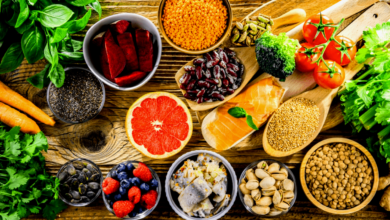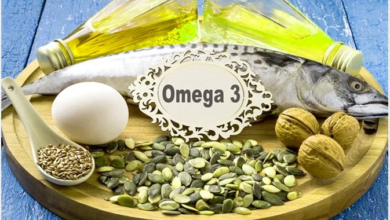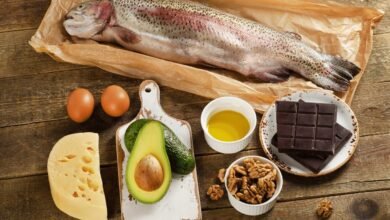5 Best Types of Food To Eat For a Healthy Gut

In terms of your general health, the healthy gut plays a significant influence. This is due to the fact that approximately 70–80 percent of your immune cells reside in your gut, and as a result, your gut microbiota has an effect on your immunological function as a whole.
Food To Eat For a Healthy Gut
The group of microorganisms (including fungus, bacteria, and viruses) that reside in your gut is referred to as your gut microbiome. The exact microorganisms that live in your gut, known as your gut microbiota, are subject to change as a result of variables such as nutrition and activity.
 Additionally, the gut-brain axis allows for direct communication between the gut and the brain, as well as the other way around. Because of this relationship, your brain has the ability to impact the activities that occur in your intestines (for example, if you have anxious diarrhea), and your intestines, in turn, have the ability to influence your mood, cognition, and mental health in either a positive or negative way.
Additionally, the gut-brain axis allows for direct communication between the gut and the brain, as well as the other way around. Because of this relationship, your brain has the ability to impact the activities that occur in your intestines (for example, if you have anxious diarrhea), and your intestines, in turn, have the ability to influence your mood, cognition, and mental health in either a positive or negative way.
Read More : Digital Detox: Managing Screen Time for Better Mental and Physical Health
Additionally, a compromised digestive tract might make it easier for germs and chemicals that cause inflammation to be absorbed from the gut into the bloodstream. This can lead to infections and inflammation across the entire body, both of which are associated with an increased chance of developing chronic diseases.
The food that you put into your digestive tract is therefore extremely important to both your physical and emotional health. For the best possible gut health, the following is a list of foods and food groups that are beneficial to the functioning of your gut and its microbiome, as well as a short list of foods that should be avoided.
Pulses
Having a healthy gut is supported by pulses. Pulses contain non-digestible carbohydrates (NDCs), which include both soluble and insoluble fiber, in addition to the plant protein and polyphenol antioxidants that they contain.
The term “prebiotic” refers to the fact that non-digestible carbohydrates (NDCs) operate as food sources for the microorganisms that are helpful to the healthy gut. In the process of fermentation, bacteria in the gut produce anti-inflammatory substances known as short-chain fatty acids (SCFAs). These molecules are produced when NDCs are fermented. Pulses include polyphenols, which have been shown to have anti-inflammatory properties and also function as extra prebiotic vitamins.
It has been demonstrated that the anti-inflammatory effects of pulses in the digestive tract can improve the health of the digestive tract, hence increasing the digestive tract’s capacity to act as a barrier between the digestive tract and the bloodstream.
A gut barrier that is in good health allows helpful elements, such as water and nutrients, to enter the bloodstream in a selective manner. Intestinal barriers that are defective or weak can allow dangerous substances to enter your blood circulation, which can lead to inflammation throughout your entire body or throughout your entire body, which is associated to a variety of illnesses and diseases. In particular, SCFAs are the ones that play a significant part in ensuring that your gut barrier remains in good shape.
Pulses include:
- Beans
- Chickpeas
- Dry peas (like split peas and black-eyed peas)
- Lentils
Probiotic Foods Healthy Gut
There is evidence that probiotics, which are live bacteria, can help modify the composition of the microbiota in your gut in ways that can boost your immune function, assist reduce the risk of obesity and diabetes, increase general health, and improve a variety of bowel illnesses. Probiotics alter the environment of the gut in such a manner that they inhibit the growth of bacteria that are detrimental to the body and allow bacteria that are beneficial to the body to flourish.
Fermented foods that have not been pasteurized, such as raw sauerkraut, are a potential source of probiotic components. Numerous studies have demonstrated that the bacteria that are present in fermented meals are able to survive digestion and make their way to the colon, where they can assist in the maintenance of immunological function.
Fermented foods may have a profound impact on immune function and may help combat non-communicable chronic diseases (NCCDs), such as obesity and diabetes, which are mostly driven by chronic inflammation. The researchers came to the conclusion that the results of the study suggest that fermented foods may have this impact.
Probiotic foods may include:
- Fermented vegetables
- Kefir
- Kimchi
- Kombucha
- Miso
- Sauerkraut
- Tempeh
- Yogurt
Prebiotic Foods Healthy Gut
By encouraging the growth of “good” bacterial strains in your gut, such as Bifidobacterium and Lactobacillus, prebiotics are able to provide nourishment to the probiotic bacteria that are already there. Additionally, they alter the pH of the intestinal tract, which inhibits the growth of pathogenic bacteria like Clostridium perfringens and Escherichia coli when they are present.
It is believed that these alterations lead to an increase in the production of a hormone known as intestinal glucagon like peptide 2 (GLP2), which is known to strengthen the strength of the gut lining. These changes also result in a reduction in inflammation in the gut.
In addition, it has been demonstrated that the fermentation of prebiotic fibers, which results in the formation of short-chain fatty acids (SCFAs), can effectively decrease feelings of hunger and enhance the management of blood sugar and insulin levels after meals.Moreover, it has been demonstrated that SCFAs have the ability to lessen inflammation and have a beneficial effect on the management of cholesterol.
When compared to the 5.5-20 grams of prebiotics that have been demonstrated to deliver advantages in scientific studies, the normal Western diet, which is often poor in vegetables, fruits, and whole grains, only supplies 1-4 grams of prebiotics per day.
Food sources of prebiotics include:
- Asparagus
- Bananas (especially when less ripe)
- Barley
- Chicory
- Garlic
- Jerusalem artichokes
- Leeks
- Onions
- Wheat bran
Foods Rich in Polyphenols
Polyphenols are a type of antioxidant that are produced by some plants. In the process of their development, these naturally occurring chemicals shield plants from harm and illness. There is a connection between polyphenols and the preservation of the heart and brain in the human body. Furthermore, studies have demonstrated that the microbiome of the gut is responsible for the transformation of polyphenols into bioactive compounds. These compounds are then absorbed into the bloodstream and manifest therapeutic actions within the body.
It is estimated that between 5 and 10 percent of the total polyphenols are absorbed into the bloodstream from the contents of the small intestine. In the large intestine, where they have prebiotic effects that positively affect the balance of “good” and “bad” healthy gut microorganisms, the remaining 90–95% of the microbes congregate. There is a connection between the breakdown of polyphenols in the gut and the support of the immune system as well as the prevention of colorectal cancer.
Polyphenol rich foods include:
- Apples
- Artichokes
- Berries
- Broad beans
- Broccoli
- Citrus fruits
- Cocoa
- Coffee
- Onions
- Pears
- Plums
- Tea
Avocados
It has been established that eating avocados is associated with a number of positive health outcomes, such as enhanced weight management and protection against cardiovascular disease.
Participants were randomly allocated to one of two groups for a period of twelve weeks. There were 163 people who were overweight or obese. Over the course of the study, participants consumed one meal per day (breakfast, lunch, or dinner) with or without avocado. During the course of the research, the participants in the study supplied samples of their blood, urine, and feces.
According to the findings of the researchers, individuals who consumed avocados had a bigger abundance of gut microorganisms that are capable of breaking down fiber and producing beneficial SCFAs. Individuals who did not consume the avocado meals did not grow the same variety of beneficial bacteria in their guts as those who did consume the avocado meals. This suggests that the avocado group absorbed less fat from their digestive tracts into their bloodstreams, despite the fact that they consumed somewhat more calories than the other group.
Additionally, they had a higher percentage of fat in their stool. According to the researchers, this is the first study to investigate the effects of avocado consumption on human gut microbiota in the absence of a caloric restriction. This removes the possibility of calorie variation being a factor in the changes that were found.
Foods to Limit for Healthy Guts
There is evidence that certain meals have a detrimental effect on the health of the gut and the bacteria that live there. For optimal gut health, limit or avoid the consumption of these items.
Red Meat
The amino acid L-carnitine, which is found in red meat, is converted by the microorganisms in the gut producing a molecule known as trimethylamine-N-oxide (TMAO). This product has been associated to the hardening of the arteries and an increase in the risk factors for heart disease. Consumption of processed red meats, such as bacon, sausage, and pepperoni, may also lead to an increase in the amount of microorganisms in the gut, which in turn can lead to an increase in inflammation and an increased risk of colorectal.
Ultra-Processed Foods
In the context of food production, ultra-processed foods are described as ready-to-eat or ready-to-heat formulations that are prepared in an industrial setting and contain food additives but contain very little or no whole foods. Sweets, chicken nuggets, hot dogs, and soft drinks are some examples of foods that fall under this category. There is a correlation between a high consumption of these foods and an increased risk of developing cardiovascular disease as well as obesity.
Alcohol
Many studies have demonstrated that drinking alcohol on a regular basis has a major impact on the microbial ecology in the gut. Alcohol consumption leads to a reduction in the number of good microbes, an increase in the number of bad microbes that promote inflammation, and an increase in the permeability of the gut, which, in turn, makes it easier for pathogenic bacteria to enter the bloodstream.
Artificial Sweeteners
Despite the fact that artificial sweeteners do not contain any sugar and do not contain any calories, their consumption has been associated with an increased risk of obesity and type 2 diabetes, and the effects may begin in the digestive tract. Following the transfer of gut microbiota from hosts who drank low-calorie sweeteners into healthy mice, the mice developed reduced glucose tolerance. These tests were conducted in order to investigate the effects of this transfer. Additional research indicates that sugar substitutes have the potential to alter the composition of microorganisms in the gut, decrease the generation of beneficial short-chain fatty acids (SCFAs), and raise inflammation.
Read More : Navigating Recovery from Anywhere: Exploring the Rise of Virtual Rehab
Conclusion Healthy Guts
Increasing the type and number of beneficial gut microbes, reducing the growth of harmful bacteria, increasing the production of anti-inflammatory compounds such as short-chain fatty acids (SCFAs), supporting immune function, and strengthening the integrity of the gut wall to prevent harmful compounds from entering the bloodstream are all benefits of eating foods that are beneficial to the gut.
Certain meals have the ability to counteract these beneficial effects within the gut, which can result in impaired immune function, the development of digestive disorders, and even an increased chance of developing chronic diseases.











